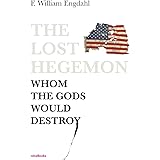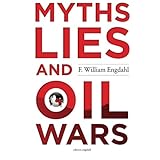




Download the free Kindle app and start reading Kindle books instantly on your smartphone, tablet, or computer - no Kindle device required.
Read instantly on your browser with Kindle for Web.
Using your mobile phone camera - scan the code below and download the Kindle app.

A Century of War: Anglo-American Oil Politics and the New World Order Paperback – January 1, 1993
Original Language: German
-
Print length282 pages
-
LanguageEnglish
-
PublisherPaul & Co Pub Consortium
-
Publication dateJanuary 1, 1993
-
Dimensions5.5 x 0.75 x 8.5 inches
-
ISBN-103925725199
-
ISBN-13978-3925725197
The Amazon Book Review
Book recommendations, author interviews, editors' picks, and more. Read it now.
Customers who viewed this item also viewed
Product details
- Publisher : Paul & Co Pub Consortium; First Edition (January 1, 1993)
- Language : English
- Paperback : 282 pages
- ISBN-10 : 3925725199
- ISBN-13 : 978-3925725197
- Item Weight : 1.05 pounds
- Dimensions : 5.5 x 0.75 x 8.5 inches
- Best Sellers Rank: #6,899,070 in Books (See Top 100 in Books)
- #22,659 in Middle East History
- #45,611 in Political Science (Books)
- #166,892 in World History (Books)
- Customer Reviews:
About the authors
-

Discover more of the author’s books, see similar authors, read author blogs and more
-

F. William Engdahl is a political economist and founder of Engdahl Strategic Risk Consulting, providing geopolitical strategic risk advice to companies and financial institutions. He has specialized for more than thirty seven years in geopolitical analysis of global events, and is an American citizen living and working in Germany since 1985.
Mr. Engdahl was a lecturer in economics at the Rhein-Main University in Germany and was a Visiting Professor in Political Economy at Beijing University of Chemical Technology.
He authored the international best-selling book on oil and geopolitics, A Century of War: Anglo-American Oil Politics, published as well in German, French, English, Chinese, Russian, Czech, Korean, Turkish, Croatian, Slovenian. In 2010 he published Gods of Money: Wall Street and the Death of the American Century and in 2013 a new edition of his best-selling Seeds of Destruction: The Hidden Agenda of Genetic Manipulation completing a trilogy on the power of oil, food and money control. His book, Target China: How Washington and Wall Street Plan to Cage the Asian Dragon appeared in 2014, and The Lost Hegemon: Whom the gods would destroy was released in summer 2015 and also was an international bestseller.
After a degree in politics from Princeton University (USA), and graduate study in comparative economics at the University of Stockholm, Engdahl worked as an independent economist and research journalist in New York and later in Europe, covering the fields of energy policy worldwide; global trade; EU food policies, the grain trade; IMF policy; Third World debt issues; the politics of hedge funds and the 2007-2015 dollar crisis.
He contributes regularly to a number of international publications and electronic media on economics and political affairs including the US Coast to Coast AM, Asia Times, FinancialSense.com, The Real News, Russia Today (RT) TV, Rossiya 1, Asia Inc., CCTV in China, Japan's Nihon Keizai Shimbun, European Banker and Globus in Croatia.
Mr. Engdahl has been a featured speaker at numerous international conferences including the keynote speech to the 2014 Third Nishan Forum on World Civilizations in Jinan, China; London Centre for Energy Policy Studies Annual Retreat, as personal guest of Hon. Sheikh Zaki Yamani; Turkish-Eurasian Business Council of Istanbul, Global Investors’ Forum (GIF), Montreaux Switzerland; Bank Negara Indonesia; the Russian Institute of Strategic Studies; the Chinese Ministry of Science and Technology (MOST) Energy Symposium, and Croatian Chamber of Commerce and Economics.
He currently lives in Germany, working as a consulting political risk economist for major European banks and private investors and writing and lecturing. A sample of his writings is available at www.williamengdahl.com.
-

Discover more of the author’s books, see similar authors, read author blogs and more
Customer reviews
Customer Reviews, including Product Star Ratings help customers to learn more about the product and decide whether it is the right product for them.
To calculate the overall star rating and percentage breakdown by star, we don’t use a simple average. Instead, our system considers things like how recent a review is and if the reviewer bought the item on Amazon. It also analyzed reviews to verify trustworthiness.
Learn more how customers reviews work on Amazon-
Top reviews
Top reviews from the United States
There was a problem filtering reviews right now. Please try again later.
* "Bretton Woods Agreements" - Engdahl explains the motivations of the Anglo-Americans behind the agreements and the central role of oil, which many discussions don't emphasise enough.
* "The New World Order" - Not a conspiracy theory, but a conspiracy fact. George HW Bush waxed poetic about the NWO until he was advised to tone it down. Rather than misquote the back of the US $1 bill, Engdahl explains what was actually meant by the NWO, at least at the time the term was current in the early 1990s.
* "Bilderberg Group" - Again, not a conspiracy theory. I quote an endnote to Chapter 9:
" 'Saltjöbaden conference' Bilderberg meetings, 11-13 May, 1973. The author obtained an original copy of the official discussion from this meeting. Normally confidential, the document was bought in a Paris used bookstore, apparently coming from the library of a member. "
In this book you will find irrefutable proof that the 1973 OPEC oil price "crisis" was the result of an elitist cabal, with the Bilderberg Group at the centre of the cabal. (And some reviewers complained about the lack of documentation!)
* "Trilateral Commission" - Founded in 1973 by David Rockefeller and Zbigniew Brzezinski, this is a very real and powerful group, indeed. Jimmy Carter, who nominally presided over what was then dubbed the "Trilateral Presidency", was selected by the Trilateraloids. By way of documentation, Engdahl lists the "Founding members of the Trilateral Commission (1973)".
* "Malthusian" - Now also "neo-Malthusian". I didn't understand what this reference to the Rev. Malthus had to do with modern economics until I read this book. Yes, overpopulation is a problem, but you don't solve the problem the way the neo-Malthusians in the IMF do it.
* "PNAC" - The Project for a New American Century, obviously not a conspiracy theory. I didn't actually see anything new about PNAC that isn't available all over the Internet, but Engdahl does weave the neocon policies into the fabric of his discussion.
* The fall of the Shah of Iran and the Russian invasion of Afghanistan. - Perhaps most people have forgotten by now that the US engineered the replacement of the Shah with the Ayatollah Ruhollah Khomeini. It seems that the Shah was not only cutting deals to bypass the Anglo-American Seven Sisters to sell oil, but was also making deals to install nuclear power plants in Iran. (Sound familiar?) This move naturally had the fingerprints of the then National Security advisor Zbigniew Brzezinski all over it. Brzezinski is also defiantly proud of provoking the Russian invasion of Afghanistan, which was perhaps the single most important factor leading to the demise of the USSR.
The second edition of this book (2004) seems to contain many new references, plus an new introduction and final chapter. If you have only read the earlier edition, I suggest getting the newer one. I would eventually like to see a third edition, in line with the changing political situation in the USA, and particularly in view of Engdahl's changed views on the source of oil since the publication of this book. He now subscribes to the a-biotic or abiotic theory, abandoning his prior belief in the peak oil theory mentioned in the final chapter of "A Century Of War".
Apropos the headline of my review, I found Engdahl's references to the "Trilateral Presidency" of Jimmy Carter and Zbigniew Brzezinski's role as one of Carter's primary advisors particularly timely. As the neocons are gradually exiting from central roles in government, control behind the scenes is inevitably shifting, perhaps back to a more left-of-centre public face. Zbigniew Brzezinski has re-surfaced lately as a darling of the Left due to his opposition to the neocon policy in the Middle East and his role as the primary foreign policy controller of Barak Obama. This book as helped convince me that Brzezinski's presence in this milieu is probably not a good sign.
I recommend keeping up with the latest articles by Mr Engdahl, which are easily found on the Internet. He now has his own website which you can easily find.
I also recommend some books that cover some of the topics in "A Century Of War" in more detail.
For a detailed look at the Anglo-American machinations against Germany after WW 1:
Conjuring Hitler: How Britain And America Made the Third Reich
What's so bad about the IMF? and details of the financial deal between the USA and Saudi Arabia in the mid-1970s:
Confessions of an Economic Hit Man
Much on the US military empire:
Nemesis: The Last Days of the American Republic (American Empire Project)
The fundamental theme of this book is to describe the relationship between international monentary policy, banking, and the geopolitics of oil, and how the confluence of these three economic factors has central link between virtually all of the great events of the 20th century. Engdahl starts by discussing the state of the British empire at the end of the 19th century, the threat posed by the industrial rise of Germany, and the role that new technologies play in this rivalry. Central to this technological revolution is an energy revolution and access to oil. He described how the large banking conglomerates of NYC and London formed and grew in power as a result of WWI and their intimate link to oil. This is tied in to the growth of the US economy before and during WWII, and the supreme position the US found itself in after the war. There is a lengthy discussion about the Bretton Woods conference in which the world formally accepted a link between the dollar and gold. The most interesting part of the book is the discussion of the floating of the dollar in the late 60s and the relationship between the dollar and 1973 oil shock. Finally, Engdahl explains how manipulations of the price of oil and the strength of the dollar have been made over the last 30 years to carry out various policy objectives. There is some discussion of peak oil in the final chapter.
There are several serious drawbacks to the book. Most importantly, the author does a great disservice to this subject by stating or (more often) implying that everything that occurs is part of some vast, organized conspiracy. It could allow critics/skeptics to dismiss the otherwise strong arguments of this book. Engdahl states that certain people `mysteriously' die, or brings up vague connections between various participants, but never explores these in depth. Second, there are not nearly enough references in this book to provide independent evidence to support many of the claims. The author should have done a MUCH better job documenting independent sources for his claims. Third, there is way too much hyperbole in this book, the language is just way overblown: everything is enormous, catastrophic, etc. Even with all these negatives though, I still rate this as a five star book because I believe that Mr. Engdahl's central argument regarding the relation between monentary policy, international banking, and the geopolitics of oil is correct, and this is the best single volume source that explains how these are tied together and how they have evolved over the past 100+ years.
Incidentally, there are two somewhat peripheral point brought up by Engdahl that most 21st century Americans will find interesting. The economic choices made by the British empire over 50+ years as it declined from the late 19th century until it was definitively replaced by the US after WWII are now being made by the US. Second, if you want to know why the US invaded Iraq, and why we are trying to instigate a war with Iran, read this book. The issue had absolutely nothing to do with WMD, Saddam's war crimes, or violations of UN resolutions. The overwhelming majority of people have no idea why we went into Iraq, and more importantly what the stakes are if we fail. People may say that it is about oil, which is true, but not in the way people think. We may never see one drop of Iraqi oil in the US, yet we still invaded. Finally, if you are sceptical of Mr. Engdahl's claim, take a look at the book `Sunrise at Abadan' about the British and Soviet invasion of Iran in 1941. Both countries were literally fighting for their lives, yet they committed vast resources to invade and occupy Iran. Richard Stewart (a retired major in the USMC) described how oil from Iran was absolutely critical to the British war effort.
Bottom line though - a shocking, eye opening book that I highly recommend, even if it is far from perfect.
Top reviews from other countries
A lot of the conspiracies that don’t come out into media are mentioned and some potential causal relations stated. E.g.: the dearth of fossil fuel in US and UK leading to Iraq war, world wars, Balkan wars. The theories sound true.
Bad part: The author’s language, grammar, sentences are sometimes shockingly bad.
Engdahl’s view appear to be predominantly left/socialist leaning. That already colours the story. When the narrative strays into economics and trade, it does not provide a balanced view. The author could easily be mistaken for a Russian or left wing apologist.
One of the problems with this book is that the author depends on people’s views to substantiate the story. For example, towards the end Engdahl cites the statement of a minister who resigned from Tony Blair’s cabinet as concrete evidence.
Having been related to the oil industry for more than a decade, I must admit that the claim Engdahl makes of limitless oil and gas is preposterous. He neither understands the technicalities nor has the ability to cover up his lack of knowledge.
Chiaro e documentato. Senza peli sulla lingua descrive quasi giornalisticamente la storia delle potenze anglosassone che hanno monopolizzato il mondo del petrolio.










